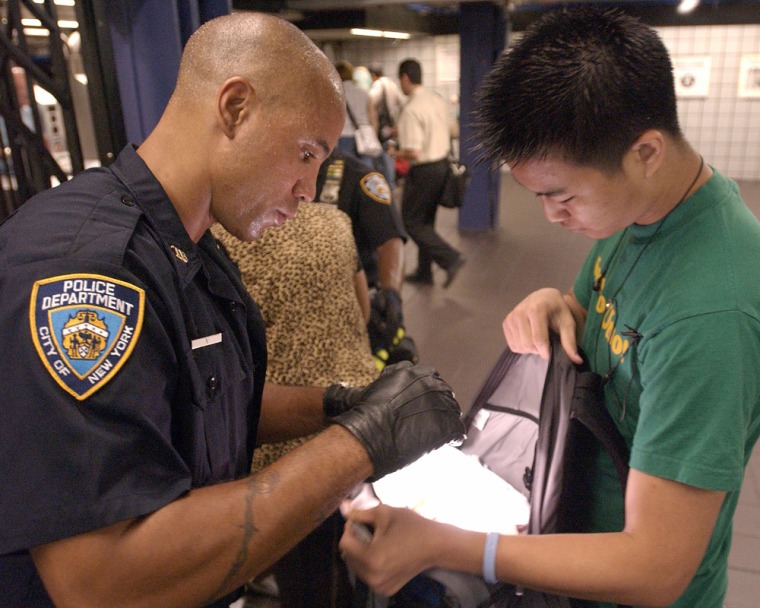Subway riders seemed resigned to random bag searches Friday as police across the region stepped up transit security in response to the new round of attacks in London.
“They should have done this long time ago, ever since 9/11,” said Manhattan stockbroker Ron Freeman, 25, who had his backpack searched on Friday morning at a subway station in Brooklyn. “I don’t mind if they’re doing it for the right cause.”
Random searches also are being conducted on buses, ferries and commuter railroads. Anyone who refuses a search won’t be allowed to ride. Those caught carrying drugs or other contraband could be arrested.
Outside the Long Island Rail Road station in Brentwood, where the police presence had been beefed up, officers arrested a man Thursday evening they said had weapons in his van and a 1996 conviction for possessing a pipe bomb. His van had been stopped because he appeared suspicious, police said.
At the Lafayette Avenue subway station in Brooklyn, Greg Morgan, 30, was among those whose bag was searched. “I don’t know how effective it will be, but if it makes people feel more secure, it’s OK.”
Every fifth person stopped
Police stopped every fifth person with a bag entering the station. Each search took only a few seconds. Police appeared to be striking a balance among those they stopped: old, young, white and black. In some cases, officers dumped the contents onto a folding table set up near the turnstiles, and in others they rifled through the bags.
Ten more officers and a bomb-sniffing dog were seen milling around the Brooklyn station.
“I thought it would never come to this,” said William Reyes, 40, who was not searched.
“Surely, we do need it,” Reyes added. “I don’t like our privacy being invaded but given the circumstances around the globe, I understand it.”
New York’s subways carry about 4.5 million passengers on the average weekday. The system, the largest in the country, has more than 468 stations, most of which have multiple entrances.
The inspections of bags and packages started on a small scale Thursday afternoon in Manhattan and were expanded during Friday morning’s rush hour.
The New York Civil Liberties Union said the new measures violate basic rights and could invite racial or religious profiling.
“The plan is not workable and will not make New Yorkers more secure but will inconvenience them as police go about finding a needle in a haystack,” NYCLU executive director Donna Lieberman said.
But Rajesh John, 34, who lives in Yonkers and is of Indian heritage, said he did not object to being selected for a bag search at the Woodlawn subway station in the Bronx Friday morning.
“No not at all. We agree with this,” said John, who was heading to his job in Manhattan. “It’s necessary because of what happened in England.”
Police said they had considered instituting bag searches for three years. The emerging pattern of attacks on transit targets in London forced their hand, said Paul Browne, the New York Police Department’s chief spokesman.
Officials declined to specify where and how frequently the checks would occur or how long they would last. The NYPD had already doubled the number of officers who patrol the subway after the initial attack in London on July 7, at a cost of $2 million a week in overtime.
“We just live in a world where, sadly, these kinds of security measures are necessary,” said Mayor Michael Bloomberg, who is known to ride the subways to work himself. “Are they intrusive? Yes, a little bit. But we are trying to find that right balance.”
